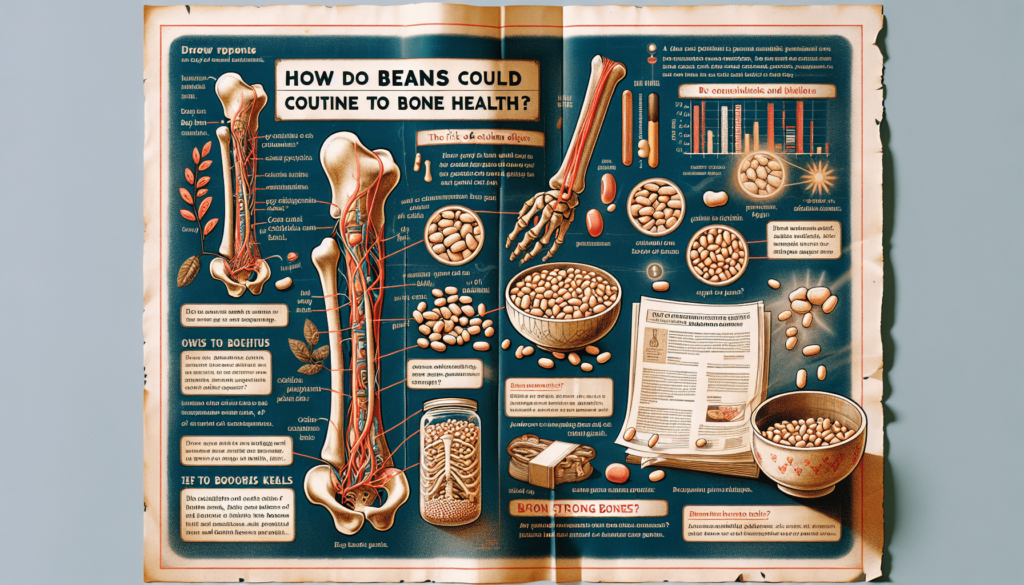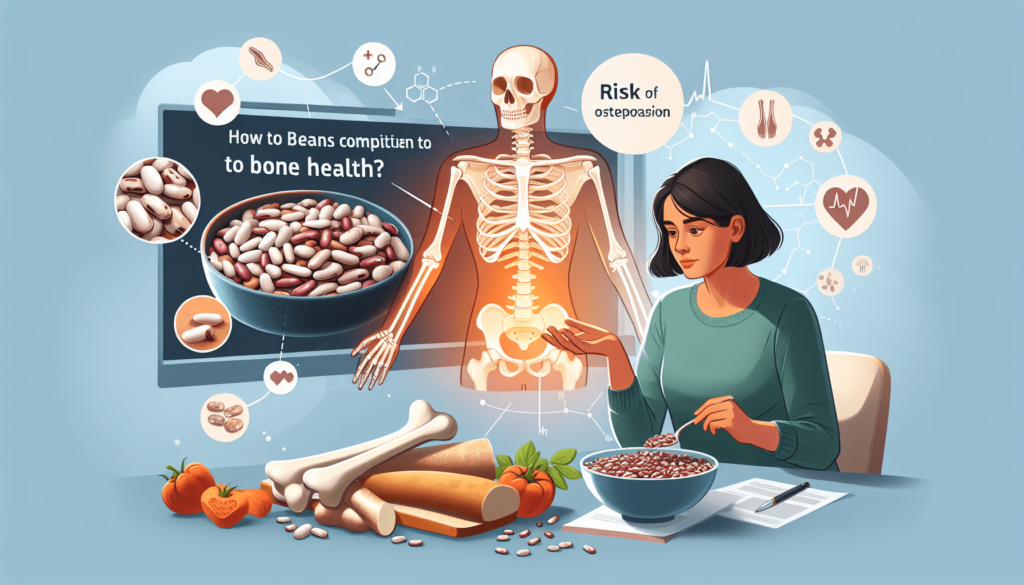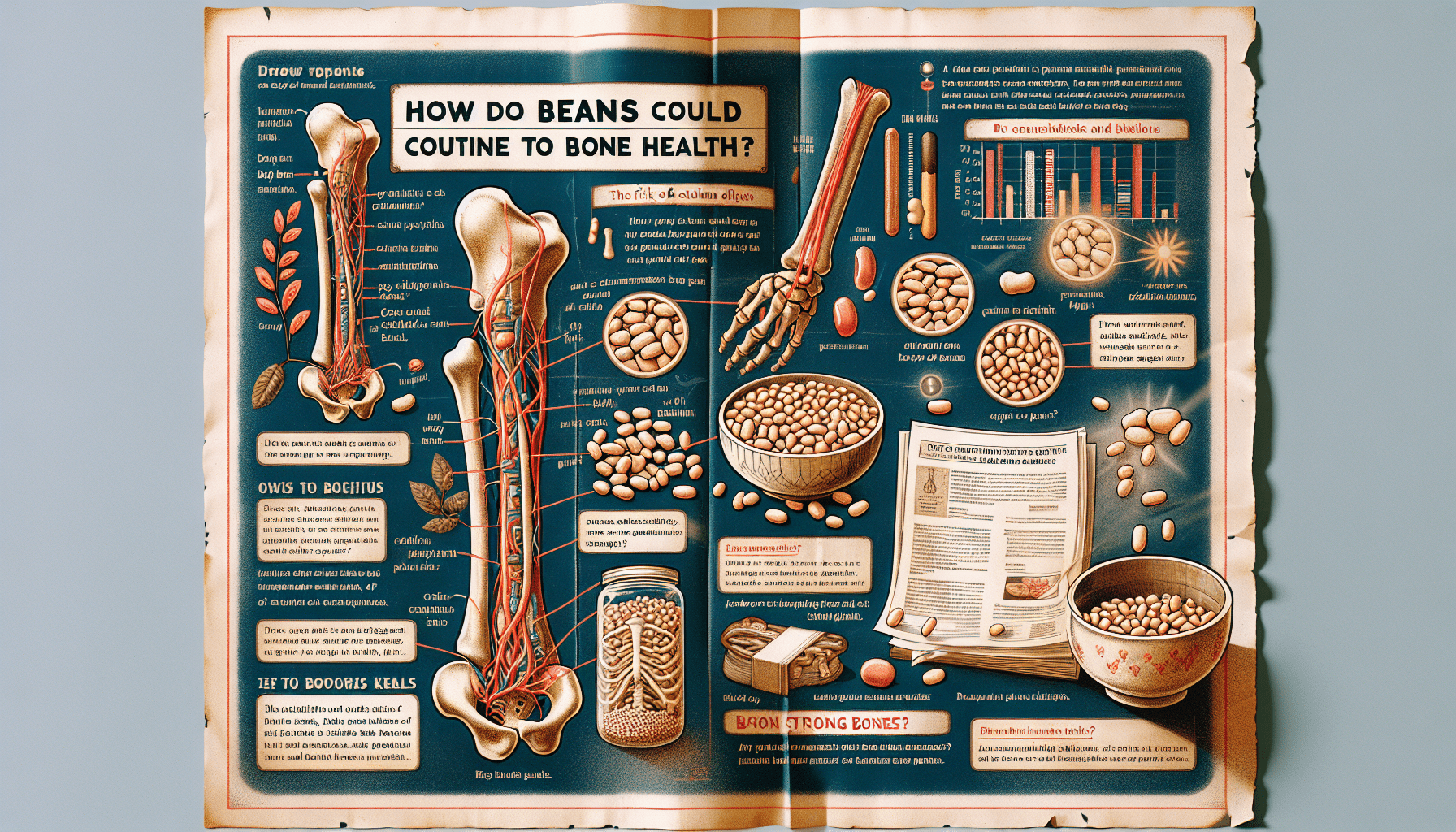Did you know that beans can actually help improve your bone health? It may come as a surprise, but these humble legumes pack a powerful punch when it comes to supporting your bones. Beans are rich in nutrients like calcium, magnesium, and phosphorus, which are essential for maintaining strong and healthy bones. In addition, they contain compounds called phytoestrogens, which have been found to increase bone density and reduce the risk of osteoporosis. So next time you’re planning your meals, don’t forget to include some beans for a tasty and bone-boosting addition to your diet!

Nutritional composition of beans
Beans are not only a delicious and versatile addition to our meals, but they also provide a wide range of essential nutrients that are beneficial for our overall health, including our bone health. Let’s take a closer look at the nutritional composition of beans and how they can support strong and healthy bones.
Rich in calcium
Calcium is a vital mineral that plays a crucial role in maintaining the health of our bones. It is the primary component of bone structure and helps to keep our bones strong and resilient. While dairy products are often considered the go-to source of calcium, beans are also an excellent source of this bone-friendly mineral. Incorporating beans into your diet can help ensure an adequate intake of calcium and support optimum bone health.
Good source of magnesium
Magnesium is another essential mineral that is closely involved in bone formation. It helps convert vitamin D into its active form, which is necessary for the absorption and utilization of calcium in our bodies. Beans, such as kidney beans and black beans, are particularly rich in magnesium, making them an excellent addition to a bone-healthy diet. By including beans in your meals, you can help support proper bone formation and maintenance.
Contain phosphorus
Phosphorus is a vital mineral found in every cell of our bodies, and it plays a vital role in maintaining the health of our bones. It works in harmony with calcium to strengthen the bone matrix and promote proper bone mineralization. Beans, including pinto beans and navy beans, contain phosphorus, making them a valuable food for supporting bone health. By incorporating beans into your diet, you can provide your body with an adequate amount of phosphorus and ensure the strength and integrity of your bones.
Provide vitamin K
Vitamin K is a crucial nutrient for bone metabolism, as it supports the regulation of calcium balance in our bodies. This vitamin helps activate proteins that are necessary for the binding of calcium to bone mineral matrix, thus promoting proper bone strength and density. Beans, such as soybeans, are a good source of vitamin K, making them a valuable addition to a bone-healthy diet. Including beans in your meals can contribute to maintaining optimal bone metabolism and overall bone health.
Contain trace minerals like zinc and copper
In addition to the major minerals like calcium, magnesium, and phosphorus, beans also contain trace minerals that play a role in bone health. Zinc and copper, in particular, are essential for the formation and maintenance of healthy bones. These trace minerals are involved in the synthesis of collagen, a protein that provides the structural framework for our bones. By incorporating beans into your diet, you can ensure a sufficient intake of trace minerals like zinc and copper, thus supporting the overall health and strength of your bones.
Role of beans in bone health
Now that we understand the nutritional composition of beans and their contribution to bone health let’s explore the specific roles that beans play in maintaining strong and healthy bones.
Calcium is vital for bone structure
Calcium is a critical mineral for the formation and maintenance of bone structure. It provides the basic building blocks for our bones and helps to keep them strong and resilient. Beans, being rich in calcium, can contribute to the overall calcium balance in our bodies and support the health of our bones.
Magnesium helps in bone formation
Alongside calcium, magnesium plays an essential role in bone formation. It helps convert vitamin D into its active form, which facilitates the absorption and utilization of calcium in our bodies. Incorporating beans into our diet ensures an adequate intake of magnesium, which in turn supports proper bone formation and maintenance.
Phosphorus strengthens bone matrix
Phosphorus is a mineral that works in synergy with calcium to strengthen the bone matrix. It promotes proper bone mineralization and density, thus contributing to the strength and integrity of our bones. By consuming beans regularly, we can provide our bodies with an adequate amount of phosphorus, ensuring the health and longevity of our bones.
Vitamin K aids in bone metabolism
Vitamin K is a crucial nutrient for bone health as it supports bone metabolism. It helps activate proteins that are involved in the binding of calcium to bone mineral matrix, thus promoting proper bone strength and density. Including beans in our diet, particularly those rich in vitamin K, can contribute to maintaining optimal bone metabolism and overall bone health.
Trace minerals contribute to bone health
In addition to the major minerals like calcium, magnesium, and phosphorus, the trace minerals found in beans also play a vital role in bone health. Minerals like zinc and copper are involved in the synthesis of collagen, which provides the structural framework for our bones. By consuming beans regularly, we can ensure an adequate intake of these trace minerals, thus supporting the overall health and strength of our bones.
Benefits of beans for bone health
Now that we understand the role that beans play in maintaining strong and healthy bones, let’s explore the specific benefits that beans offer for our bone health.
Reduced risk of osteoporosis
Osteoporosis, a condition characterized by weak and brittle bones, is a significant concern, especially as we age. By consuming beans regularly, we can reduce the risk of developing osteoporosis. The calcium, magnesium, phosphorus, vitamin K, and trace minerals present in beans work together to support optimal bone health and density, thus reducing the risk of osteoporosis.
Promotion of bone density
Maintaining healthy bone density is essential for preventing fractures and maintaining overall bone strength. By incorporating beans into our diet, we can promote bone density, ensuring that our bones remain strong and resilient.
Enhanced bone strength
Strong and healthy bones are crucial for optimal physical performance and overall well-being. By consuming beans, which are packed with essential nutrients for bone health, we can enhance the strength of our bones and support our overall physical health.
Prevention of bone fractures
Weak and brittle bones are more prone to fractures, which can significantly impact our quality of life. The nutrients found in beans, such as calcium, magnesium, phosphorus, vitamin K, and trace minerals, contribute to the strength and density of our bones, thus reducing the risk of fractures.
Improved bone health during aging
As we age, our bones naturally become more susceptible to degeneration and loss of density. However, by incorporating beans into our diet, we can improve the health of our bones during the aging process. The various nutrients found in beans can help slow down bone loss and support the maintenance of strong and healthy bones as we grow older.

Bean varieties and their impact on bone health
While all beans offer health benefits, some varieties are particularly beneficial for our bone health. Let’s explore a few bean varieties and their impact on our bones.
Kidney beans
Kidney beans are an excellent source of calcium, magnesium, and phosphorus, making them a valuable addition to a bone-healthy diet. These nutrients work together to support the strength and density of our bones, thus promoting overall bone health.
Black beans
Black beans are rich in calcium, magnesium, and trace minerals like zinc and copper. These nutrients are essential for bone formation and maintenance, making black beans a great choice for supporting strong and healthy bones.
Pinto beans
Pinto beans are high in magnesium, calcium, and phosphorus, all of which are vital for bone health. Including pinto beans in our meals can help ensure an adequate intake of these nutrients, thus supporting optimal bone strength.
Navy beans
Navy beans are a good source of magnesium and phosphorus, both of which play a crucial role in bone formation. By consuming navy beans regularly, we can support proper bone development and maintenance.
Soybeans
Soybeans are not only rich in calcium but also contain high levels of vitamin K. These nutrients work together to support bone metabolism and density, making soybeans an excellent choice for maintaining strong and healthy bones.
Recipes incorporating beans for bone health
Now that we understand the benefits of beans for bone health let’s explore some delicious recipes that incorporate beans and can contribute to the health of our bones.
Bean salad with leafy greens
A refreshing and nutritious bean salad can be an excellent choice for boosting our bone health. Combine kidney beans, black beans, or any other bean variety of your choice with a medley of leafy greens like spinach, kale, and arugula. Drizzle with a light vinaigrette dressing, and you have a delicious and bone-healthy salad that can be enjoyed as a meal or a side dish.
Black bean soup
A warm and comforting bowl of black bean soup can provide a hearty dose of nutrients for our bones. Start by cooking black beans with onions, garlic, and a medley of vegetables. Once the beans are tender, blend them to create a smooth and creamy soup. Season with herbs and spices of your choice for added flavor. This nourishing soup is not only delicious but also packed with bone-healthy nutrients.
Chickpea curry
Chickpeas, also known as garbanzo beans, are a nutritious legume that can be used to create a flavorful and satisfying curry. Saute onions, garlic, and spices like cumin, turmeric, and coriander in a pan. Add cooked chickpeas and a tomato-based sauce, and let it simmer until the flavors meld together. Serve with steamed rice or whole wheat naan bread for a delicious and bone-healthy meal.
Bean and vegetable stir-fry
Stir-fries are a quick and easy way to incorporate beans into our meals. Saute a variety of vegetables like bell peppers, broccoli, carrots, and snap peas in a pan. Add cooked beans, such as pinto beans or kidney beans, and toss with a flavorful sauce made from low-sodium soy sauce, garlic, ginger, and a touch of honey. Serve over brown rice or quinoa for a nutrient-packed and bone-healthy stir-fry.
Lentil and tomato stew
Lentils, a type of legume, are a fantastic source of bone-healthy nutrients. A hearty lentil and tomato stew can provide a satisfying and nutritious meal that supports bone health. Cook lentils with tomatoes, onions, carrots, and spices like cumin and paprika. Let the stew simmer until the flavors develop, and serve with a side of whole grain bread for a complete and bone-healthy meal.
Tips for incorporating more beans into your diet
Now that we have explored various recipes incorporating beans let’s look at some tips for incorporating more beans into our daily diet to support our bone health.
Choose whole beans over canned varieties
While canned beans are convenient, they often contain added sodium and preservatives. Opting for dried or whole beans allows you to control the amount of sodium and other additives in your meals, making them a healthier choice for your bones.
Soak and cook beans properly
Soaking beans before cooking can help reduce cooking time and make them more digestible. Additionally, it is essential to cook beans thoroughly to ensure that potentially harmful compounds, such as lectins, are neutralized.
Add beans to salads, soups, and stews
Incorporating beans into salads, soups, and stews is a simple and delicious way to increase your bean intake. Add kidney beans or chickpeas to your favorite salads, black beans to your soups, or pinto beans to your stews for a nutrient boost and enhanced bone health.
Replace meat with beans in recipes
Beans are a fantastic plant-based protein source that can easily substitute meat in various recipes. Consider replacing meat with beans in dishes like chili, tacos, or even burgers for a delicious and bone-healthy alternative.
Experiment with different bean varieties
There is a wide variety of beans available, each with its unique flavor and texture. Experimenting with different bean varieties can add variety and excitement to your meals. Try kidney beans, black beans, pinto beans, navy beans, or even soybeans to discover new flavors and reap the benefits they offer for your bone health.
Other factors influencing bone health
While beans play a valuable role in supporting bone health, there are other factors that we should consider to maintain strong and healthy bones. Let’s explore these factors and their importance.
Physical activity and exercise
Regular physical activity and exercise are essential for maintaining bone health. Weight-bearing exercises like walking, running, and weightlifting help stimulate bone growth and strengthen our bones. Incorporating regular exercise into your routine, alongside a bean-rich diet, can support optimal bone health.
Adequate vitamin D levels
Vitamin D is crucial for the absorption and utilization of calcium in our bodies. Spending time outdoors and exposing our skin to sunlight can help our bodies produce vitamin D naturally. However, depending on our location and lifestyle, it may be necessary to supplement with vitamin D to ensure adequate levels for optimal bone health.
Avoidance of excessive alcohol consumption
Excessive alcohol consumption can have detrimental effects on bone health. It can interfere with the normal process of bone remodeling and lead to weakened bones. Moderation is key, and limiting alcohol intake is essential for maintaining healthy bones.
Limitation of caffeine intake
Caffeine, commonly found in coffee, tea, and some soft drinks, can interfere with calcium absorption in our bodies. While moderate caffeine consumption is generally safe, excessive intake can contribute to reduced bone mineral density. Monitoring and limiting caffeine intake is essential for supporting optimal bone health.
Maintaining a healthy body weight
Maintaining a healthy body weight is crucial for overall health, including bone health. Both obesity and being underweight can have negative effects on bone strength and density. By maintaining a healthy body weight through a balanced diet and regular exercise, we can support our bones’ health and longevity.
Considerations and precautions
While beans offer numerous benefits for bone health, there are a few considerations and precautions we should keep in mind.
Possible flatulence and digestive issues
Beans contain complex carbohydrates that can be difficult for some individuals to digest. This can lead to gas and bloating. Soaking and cooking beans properly can help reduce these digestive issues. Additionally, gradually increasing your bean intake can give your digestive system time to adjust.
Allergies or sensitivities to beans
Some individuals may have allergies or sensitivities to beans, and this can cause adverse reactions. If you experience any symptoms like itching, hives, or difficulty breathing after consuming beans, it is important to seek medical advice and avoid beans if necessary.
Consultation with a healthcare professional
If you have any underlying health conditions or concerns about your bone health, it is always advisable to consult with a healthcare professional. They can provide personalized guidance and recommendations based on your specific needs and circumstances.
Balanced diet and overall lifestyle
While beans offer numerous benefits for bone health, it is essential to remember that overall lifestyle and a balanced diet play a crucial role in maintaining optimal bone health. A diet rich in fruits, vegetables, whole grains, lean proteins, and healthy fats, alongside regular exercise and other lifestyle factors, is key to supporting strong and healthy bones.
Conclusion
Incorporating beans into our diet is a simple and delicious way to support our bone health. The nutritional composition of beans, including their calcium, magnesium, phosphorus, vitamin K, and trace mineral content, make them a valuable addition to a bone-healthy diet. Regular consumption of beans can reduce the risk of osteoporosis, promote bone density, enhance bone strength, prevent bone fractures, and improve bone health during aging. By combining beans with other factors like physical activity, vitamin D levels, alcohol and caffeine moderation, and maintaining a healthy body weight, we can ensure the long-term health and strength of our bones. So why not start incorporating more beans into your diet today? Your bones will thank you!

